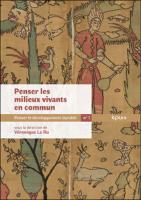Penser les milieux vivants en commun
Abstract
This book brings together various texts on the shared nature of living environments. It is based on the idea that it is through reflection on the universal that we will be able to ensure the resilience and sustainability of socio-ecosystems. This requires a new conception of the universal, in order to define the living environment on the basis of three notions: individuals, species and environments. Comment partager les milieux vivants de manière à ce que chaque individu humain et autre qu’humain y trouve sa place, puisse y faire son milieu ? Penser les milieux vivants en commun engage une réflexion sur l’universel : tout individu vit dans un milieu. Mais cela engage une nouvelle conception de l’universel décentrée de l’humain et refondée dans les milieux vivants (qui incluent l’espèce humaine). Approcher l’universel des milieux vivants, c’est penser un sujet collectif et politique qui a des droits (pour les individus humains et autres qu’humains) et des devoirs (pour les individus humains seulement, selon la règle du pollueur-payeur car seuls les humains détruisent l’habitabilité et la cohabitabilité du monde). Les droits de ce sujet collectif se résument à un seul : le droit de vivre dans un monde durable et même désirable par sa qualité de vie ; et les devoirs eux aussi se résument à un seul : le devoir de protéger la cohabitabilité de ce monde, la coexistence d’individus humains et autres qu’humains qui pourront tous y déployer leur style de vie et leur projet de vie en termes de situation et de liberté.
Keywords
Sustainability; Ecology; SpeciesismDOI
10.34929/56px-c305ISBN
9782374961347, 9782374961279, 9782374961347Publisher website
https://www.univ-reims.fr/epure/Publication date and place
Reims, 2021Series
Penser le développement durable, 1Classification
Environmentalist thought and ideology
Conservation of wildlife and habitats
Social and political philosophy


 Download
Download